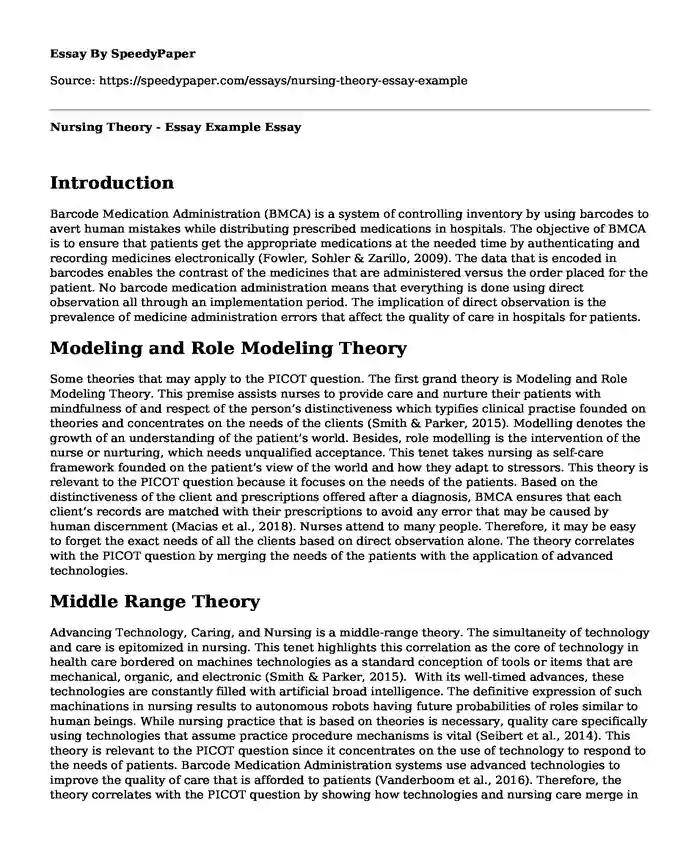
| Type of paper: | Essay |
| Categories: | Nursing management |
| Pages: | 3 |
| Wordcount: | 775 words |
Introduction
Barcode Medication Administration (BMCA) is a system of controlling inventory by using barcodes to avert human mistakes while distributing prescribed medications in hospitals. The objective of BMCA is to ensure that patients get the appropriate medications at the needed time by authenticating and recording medicines electronically (Fowler, Sohler & Zarillo, 2009). The data that is encoded in barcodes enables the contrast of the medicines that are administered versus the order placed for the patient. No barcode medication administration means that everything is done using direct observation all through an implementation period. The implication of direct observation is the prevalence of medicine administration errors that affect the quality of care in hospitals for patients.
Modeling and Role Modeling Theory
Some theories that may apply to the PICOT question. The first grand theory is Modeling and Role Modeling Theory. This premise assists nurses to provide care and nurture their patients with mindfulness of and respect of the person’s distinctiveness which typifies clinical practise founded on theories and concentrates on the needs of the clients (Smith & Parker, 2015). Modelling denotes the growth of an understanding of the patient’s world. Besides, role modelling is the intervention of the nurse or nurturing, which needs unqualified acceptance. This tenet takes nursing as self-care framework founded on the patient’s view of the world and how they adapt to stressors. This theory is relevant to the PICOT question because it focuses on the needs of the patients. Based on the distinctiveness of the client and prescriptions offered after a diagnosis, BMCA ensures that each client’s records are matched with their prescriptions to avoid any error that may be caused by human discernment (Macias et al., 2018). Nurses attend to many people. Therefore, it may be easy to forget the exact needs of all the clients based on direct observation alone. The theory correlates with the PICOT question by merging the needs of the patients with the application of advanced technologies.
Middle Range Theory
Advancing Technology, Caring, and Nursing is a middle-range theory. The simultaneity of technology and care is epitomized in nursing. This tenet highlights this correlation as the core of technology in health care bordered on machines technologies as a standard conception of tools or items that are mechanical, organic, and electronic (Smith & Parker, 2015). With its well-timed advances, these technologies are constantly filled with artificial broad intelligence. The definitive expression of such machinations in nursing results to autonomous robots having future probabilities of roles similar to human beings. While nursing practice that is based on theories is necessary, quality care specifically using technologies that assume practice procedure mechanisms is vital (Seibert et al., 2014). This theory is relevant to the PICOT question since it concentrates on the use of technology to respond to the needs of patients. Barcode Medication Administration systems use advanced technologies to improve the quality of care that is afforded to patients (Vanderboom et al., 2016). Therefore, the theory correlates with the PICOT question by showing how technologies and nursing care merge in healthcare.
Conclusion
In conclusion, the Barcode Medication Administration (BMCA) is a system of controlling inventory by using barcodes to avert human mistakes while distributing prescribed medications in hospitals. The reliance on observation by nurses can yield errors while administering medications to patients. BMCA, therefore, comes across as an indispensable system in improving the quality of health care. Some nursing theories applicable to the PICOT question in this paper were Modeling and Role Modeling Theory and Advancing Technology, Caring, and Nursing Theory. They are relevant and correlate with the PICOT question particularly when it comes to improving the quality of care given to patients.
References
Fowler SB, Sohler P, Zarillo DF. Bar-code technology for medication administration: medication errors and nurse satisfaction. Medsurg Nurs. 2009 Mar-Apr;18(2):103-9. PMID: 19489208.
Macias, M., Bernabeu-Andreu, F., Arribas, I., Navarro, F., & Baldominos, G. (2018). Impact of a barcode medication administration system on patient safety. Oncology Nursing Forum, 45(1), E1-E13.
https://doi.org/10.1188/18.onf.e1-e13
Seibert, H. H., Maddox, R. R., Flynn, E. A., & Williams, C. K. (2014). Effect of barcode technology with electronic medication administration record on medication accuracy rates. American Journal of Health-System Pharmacy, 71(3), 209-218.
https://doi.org/10.2146/ajhp130332
Smith, M. C., & Parker, M. E. (2015). Nursing theories and nursing practice. FA Davis.
Vanderboom, C. E., Scherb, C. A., Kirchner, R. B., Kohler, C. M., Ferrier, J. J., Stancl, M. A., ... & Cox, D. L. (2016). Leadership strategies, an interdisciplinary team, and ongoing nurse feedback: ingredients for a successful BCMA project. Nursing Economics, 34(3), 117.
Cite this page
Nursing Theory - Essay Example. (2024, Jan 01). Retrieved from https://speedypaper.com/essays/nursing-theory-essay-example
Request Removal
If you are the original author of this essay and no longer wish to have it published on the SpeedyPaper website, please click below to request its removal:
- Nursing Essay Example: Use of Evidence-based Practice in the Clinical Site
- Essay Sample: Ethical Dilemma in Nursing Care
- Paper Exampl on Disaster Response and Emergency Preparedness
- Essay Sample on Consumer Health Informatics
- Essay Sample on Difference Between A DNP and A Ph.D. in Nursing
- Free Essay on Non-Profit Nursing Home
- Free Essay: Decision Making and Management in Nursing
Popular categories




